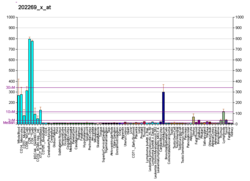GBP1
Interferonski-inducirani gvanilat-vezujući protein 1 jest protein koji je kod ljudi kodiran genom GBP1 sa hromosoma 1.[3][4] Pripada dinaminskoj natporodici velikih GTPaza.[5]
Amiokiselininska sekvenca
urediDužina polipeptidnog lanca je 592 aminokiseline, a molekulska težina 67.931 Da.[6].
| 10 | 20 | 30 | 40 | 50 | ||||
|---|---|---|---|---|---|---|---|---|
| MASEIHMTGP | MCLIENTNGR | LMANPEALKI | LSAITQPMVV | VAIVGLYRTG | ||||
| KSYLMNKLAG | KKKGFSLGST | VQSHTKGIWM | WCVPHPKKPG | HILVLLDTEG | ||||
| LGDVEKGDNQ | NDSWIFALAV | LLSSTFVYNS | IGTINQQAMD | QLYYVTELTH | ||||
| RIRSKSSPDE | NENEVEDSAD | FVSFFPDFVW | TLRDFSLDLE | ADGQPLTPDE | ||||
| YLTYSLKLKK | GTSQKDETFN | LPRLCIRKFF | PKKKCFVFDR | PVHRRKLAQL | ||||
| EKLQDEELDP | EFVQQVADFC | SYIFSNSKTK | TLSGGIQVNG | PRLESLVLTY | ||||
| VNAISSGDLP | CMENAVLALA | QIENSAAVQK | AIAHYEQQMG | QKVQLPTETL | ||||
| QELLDLHRDS | EREAIEVFIR | SSFKDVDHLF | QKELAAQLEK | KRDDFCKQNQ | ||||
| EASSDRCSAL | LQVIFSPLEE | EVKAGIYSKP | GGYRLFVQKL | QDLKKKYYEE | ||||
| PRKGIQAEEI | LQTYLKSKES | MTDAILQTDQ | TLTEKEKEIE | VERVKAESAQ | ||||
| ASAKMLQEMQ | RKNEQMMEQK | ERSYQEHLKQ | LTEKMENDRV | QLLKEQERTL | ||||
| ALKLQEQEQL | LKEGFQKESR | IMKNEIQDLQ | TKMRRRKACT | IS |
Funkcija
urediGvanilatna ekspresija vezivnog proteina indukovana je interferonom. Proteini koji se vezuju za gvanilat karakteriše njihova sposobnost da specifično vežu nukleotide guanina (GMP, GDP i GTP) i razlikuju se od GTP-vezujućih proteina po prisustvu dva motiva vezivanja, a ne tri.[4]
Reference
uredi- ^ a b c GRCh38: Ensembl release 89: ENSG00000117228 - Ensembl, maj 2017
- ^ "Human PubMed Reference:". National Center for Biotechnology Information, U.S. National Library of Medicine.
- ^ Strehlow I, Lohmann-Matthes ML, Decker T (Aug 1994). "The interferon-inducible GBP1 gene: structure and mapping to human chromosome 1". Gene. 144 (2): 295–9. doi:10.1016/0378-1119(94)90393-X. PMID 7518790.
- ^ a b "Entrez Gene: GBP1 guanylate binding protein 1, interferon-inducible, 67kDa".
- ^ Praefcke GJ, McMahon HT (februar 2004). "The dynamin superfamily: universal membrane tubulation and fission molecules?". Nat. Rev. Mol. Cell Biol. 5 (2): 133–47. doi:10.1038/nrm1313. PMID 15040446. S2CID 6305282.
- ^ "UniProt, P32455" (jezik: eng.). Pristupljeno 27. 11. 2021.CS1 održavanje: nepoznati jezik (link)
Dopunska literatura
uredi- Anderson NL, Anderson NG (2003). "The human plasma proteome: history, character, and diagnostic prospects". Mol. Cell. Proteomics. 1 (11): 845–67. doi:10.1074/mcp.R200007-MCP200. PMID 12488461.
- Naschberger E, Bauer M, Stürzl M (2006). "Human guanylate binding protein-1 (hGBP-1) characterizes and establishes a non-angiogenic endothelial cell activation phenotype in inflammatory diseases". Adv. Enzyme Regul. 45: 215–27. doi:10.1016/j.advenzreg.2005.02.011. PMID 16005050.
- Cheng YS, Patterson CE, Staeheli P (1991). "Interferon-induced guanylate-binding proteins lack an N(T)KXD consensus motif and bind GMP in addition to GDP and GTP". Mol. Cell. Biol. 11 (9): 4717–25. doi:10.1128/MCB.11.9.4717. PMC 361367. PMID 1715024.
- Nantais DE, Schwemmle M, Stickney JT, et al. (1996). "Prenylation of an interferon-gamma-induced GTP-binding protein: the human guanylate binding protein, huGBP1". J. Leukoc. Biol. 60 (3): 423–31. doi:10.1002/jlb.60.3.423. PMID 8830800. S2CID 33727864.
- Saunders NA, Smith RJ, Jetten AM (1999). "Regulation of guanylate-binding protein expression in interferon-gamma-treated human epidermal keratinocytes and squamous cell carcinoma cells". J. Invest. Dermatol. 112 (6): 977–83. doi:10.1046/j.1523-1747.1999.00611.x. PMID 10383748.
- Prakash B, Praefcke GJ, Renault L, et al. (2000). "Structure of human guanylate-binding protein 1 representing a unique class of GTP-binding proteins". Nature. 403 (6769): 567–71. Bibcode:2000Natur.403..567P. doi:10.1038/35000617. PMID 10676968. S2CID 4431592.
- Kumar S, Li Q, Dua A, et al. (2001). "Messenger ribonucleic acid encoding interferon-inducible guanylate binding protein 1 is induced in human endometrium within the putative window of implantation". J. Clin. Endocrinol. Metab. 86 (6): 2420–7. doi:10.1210/jc.86.6.2420. PMID 11397834.
- Guenzi E, Töpolt K, Cornali E, et al. (2001). "The helical domain of GBP-1 mediates the inhibition of endothelial cell proliferation by inflammatory cytokines". EMBO J. 20 (20): 5568–77. doi:10.1093/emboj/20.20.5568. PMC 125279. PMID 11598000.
- Lubeseder-Martellato C, Guenzi E, Jörg A, et al. (2002). "Guanylate-Binding Protein-1 Expression Is Selectively Induced by Inflammatory Cytokines and Is an Activation Marker of Endothelial Cells during Inflammatory Diseases". Am. J. Pathol. 161 (5): 1749–59. doi:10.1016/S0002-9440(10)64452-5. PMC 1850787. PMID 12414522.
- Strausberg RL, Feingold EA, Grouse LH, et al. (2003). "Generation and initial analysis of more than 15,000 full-length human and mouse cDNA sequences". Proc. Natl. Acad. Sci. U.S.A. 99 (26): 16899–903. doi:10.1073/pnas.242603899. PMC 139241. PMID 12477932.
- Adkins JN, Varnum SM, Auberry KJ, et al. (2003). "Toward a human blood serum proteome: analysis by multidimensional separation coupled with mass spectrometry". Mol. Cell. Proteomics. 1 (12): 947–55. doi:10.1074/mcp.M200066-MCP200. PMID 12543931.
- Guenzi E, Töpolt K, Lubeseder-Martellato C, et al. (2003). "The guanylate binding protein-1 GTPase controls the invasive and angiogenic capability of endothelial cells through inhibition of MMP-1 expression". EMBO J. 22 (15): 3772–82. doi:10.1093/emboj/cdg382. PMC 169055. PMID 12881412.
- Naschberger E, Werner T, Vicente AB, et al. (2004). "Nuclear factor-kappaB motif and interferon-alpha-stimulated response element co-operate in the activation of guanylate-binding protein-1 expression by inflammatory cytokines in endothelial cells". Biochem. J. 379 (Pt 2): 409–20. doi:10.1042/BJ20031873. PMC 1224089. PMID 14741045.
- Gerhard DS, Wagner L, Feingold EA, et al. (2004). "The Status, Quality, and Expansion of the NIH Full-Length cDNA Project: The Mammalian Gene Collection (MGC)". Genome Res. 14 (10B): 2121–7. doi:10.1101/gr.2596504. PMC 528928. PMID 15489334.
- Praefcke GJ, Kloep S, Benscheid U, et al. (2004). "Identification of residues in the human guanylate-binding protein 1 critical for nucleotide binding and cooperative GTP hydrolysis". J. Mol. Biol. 344 (1): 257–69. doi:10.1016/j.jmb.2004.09.026. PMID 15504415.
- Modiano N, Lu YE, Cresswell P (2005). "Golgi targeting of human guanylate-binding protein-1 requires nucleotide binding, isoprenylation, and an IFN-γ-inducible cofactor". Proc. Natl. Acad. Sci. U.S.A. 102 (24): 8680–5. Bibcode:2005PNAS..102.8680M. doi:10.1073/pnas.0503227102. PMC 1150846. PMID 15937107.
- Ghosh A, Praefcke GJ, Renault L, et al. (2006). "How guanylate-binding proteins achieve assembly-stimulated processive cleavage of GTP to GMP". Nature. 440 (7080): 101–4. Bibcode:2006Natur.440..101G. doi:10.1038/nature04510. PMID 16511497. S2CID 4405773.




